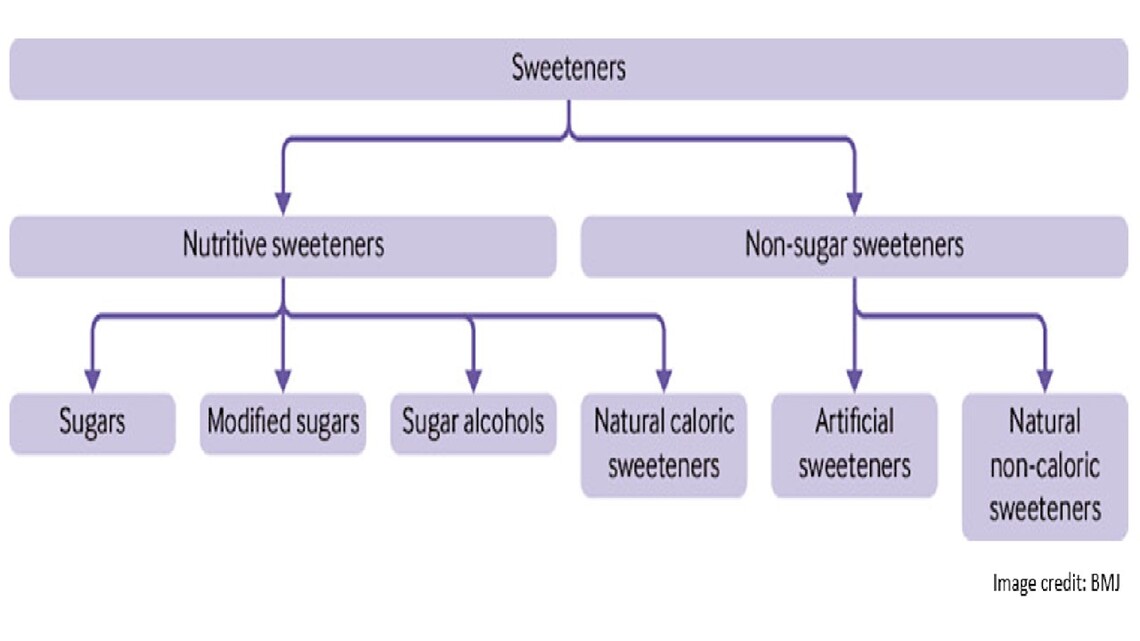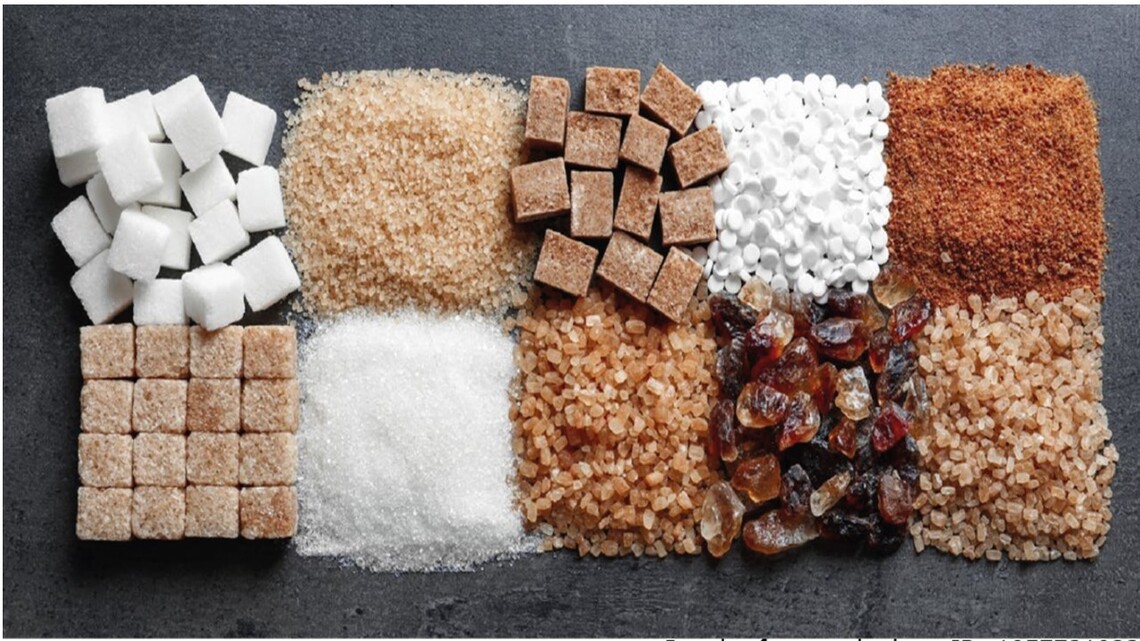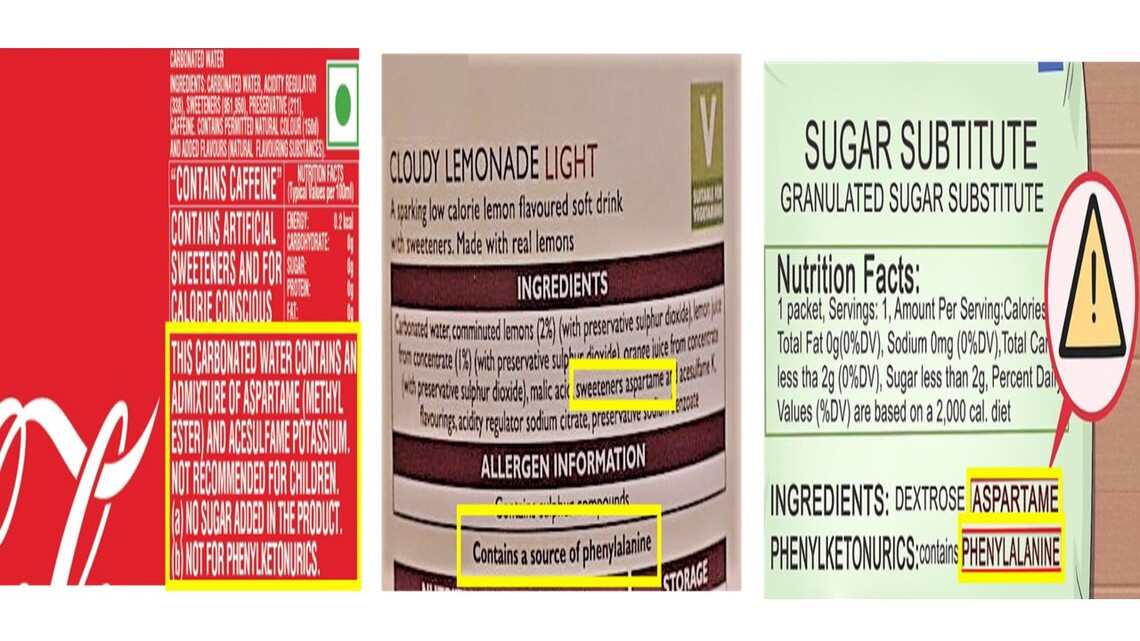Artificial sweeteners
- What are sweeteners?
- Are they safe?
- Consumption in the UK
- Do artificial sweeteners cause weight gain?
- Artificial sweeteners and cancer
- Blood sugar control and dental health
- Artificial sweeteners and gut health
- Labelling and health claims
- Conclusions
What are sweeteners?
Sweeteners provide a sweet taste to food and drinks as an alternative to sugar (sucrose). They contain fewer calories than sugar (or even no calories) and can be up to 600 times sweeter than sugar, which means they can be used in very small quantities.
Sweeteners can be divided into ‘nutritive sweeteners’ and ‘non-sugar sweeteners’.
- Nutritive sweeteners include sugars, modified sugars, sugar alcohols (known as polyols, such as xylitol, sorbitol and mannitol) and natural caloric sweeteners (which provide calories and energy in the form of carbohydrates, such as sucrose and fructose).
- Non-sugar sweeteners include artificial sweeteners and natural non-caloric sweeteners, for example stevia, which is derived from the leaves of a South American plant. Non-sugar sweeteners provide few or no calories.
There are 11 types of artificial sweeteners licensed for use in the UK, each with a different ‘sweetness potency’. The most commonly known are saccharin, sucralose, acesulfame K (ace-K) and aspartame.
Artificial sweeteners are often found in ‘no added sugar’ soft drinks, energy drinks, confectionery, frozen desserts, chewing gum, yoghurts. They can also be used as table-top sweeteners in the form of pills, powder or granules.
Are they safe?
|
Artificial sweeteners in food and drink pose no threat to our health if consumed within the daily limits. (European Food Safety Authority, 2013) |
With two limited exceptions, the answer seems to be that artificial sweeteners are safe to consume. In the EU, rigorous safety tests are conducted on all artificial sweeteners used in food and drinks before approval by the European Commission. There are Acceptable Daily Intake (ADI) levels set for each sweetener. Current reviews have suggested that artificial sweeteners are safe for consumption by children and adults if consumed within their ADI. For example, the daily limit for aspartame is equivalent to 15 cans of diet Coke. Studies have shown that the average intake of sweeteners in the EU is below the ADI, even amongst high consumers.
Artificial sweeteners, however, are not permitted for use in foods for infants and young children under the age of three years. Young children require energy-dense, nutritious food for optimal growth and development, and therefore low-calorie sweeteners are not suitable for them.
Aspartame is also an exception as it is metabolised to produce the amino acid phenylalanine as well as aspartic acid and methanol. Individuals with a rare genetic condition called phenylketonuria (PKU) cannot consume aspartame because their bodies are unable to break down phenylalanine, which can then build up to harmful levels. To inform consumers with PKU, labelling products containing aspartame is mandatory in the UK.
Consumption in the UK
The NHS recommends that we consume no more than 30 grams of added sugar per day (roughly equivalent to 7 sugar cubes). However, in 2018 Public Health England reported that people had, on average, been consuming nearly three times the recommended daily intake. Substituting non-sugar sweeteners may therefore help to reduce this consumption to meet the recommended levels.
Consumer research has shown a rise in consumption of soft drinks containing artificial sweeteners in the UK. This is likely to have been influenced by the UK Soft Drinks Industry Levy, which was introduced in 2018 as part of the UK government’s plans to reduce childhood obesity. The soft drinks levy has led the drinks industry to reformulate its products to include more low- or zero-calorie sweeteners.
Do artificial sweeteners cause weight gain?
|
To reduce your body weight, you need to consume fewer calories than you burn and then maintain that calorie deficit over time. |
Most artificial sweeteners are not broken down by the body but are excreted, so they do not add calories.
However, there is mixed evidence on the link between sweeteners and weight gain/obesity. Observational studies have found that the consumption of diet drinks is linked to weight gain and to obesity in adults. This may be due to artificial sweeteners increasing appetite or decreasing the feeling of being full or satisfied. Consuming diet drinks may also increase people’s preference for other sweet foods and/or motivate them to include foods with more calories in their diet.
However, observational studies can be interpreted in different ways. For example, it may be the case that people with obesity are more likely to consume diet drinks, rather than drinks themselves causing them to gain weight.
Randomised control trials have found either no effect or only modest reductions in body weight amongst people consuming artificial sweeteners instead of sugar-sweetened drinks. A recent systematic review found little evidence in body weight change between people who received sweeteners in medical trials compared with those who received sugars or placebos. However, a small number of individual studies did show a significant reduction in body weight amongst overweight and obese adults who consumed artificially sweetened products. This reduction in body weight was not seen in normal weight adults.
Artificial sweeteners and cancer
There has been widespread media concern regarding a possible link between artificial sweeteners and cancer. However, Cancer Research UK states that there is no strong evidence that artificially sweetened drinks are a cause of cancer in humans.
Xytol and dental health
The artificial sweetener xylitol, when replacing sugar, improves dental health by reducing plaque formation, inhibiting tooth enamel demineralisation and reducing levels of bacteria in plaque and saliva
Artificial sweeteners and gut health
Research suggests that a healthy gut may be good for our health more generally, for example supporting our immune system and reducing the risk of obesity, heart attack and stroke.
Our gut is in constant communication with our brain; this is known as our ‘gut–brain axis’. Hormones from the gut relay information to our brain about whether we are full or hungry. Emerging evidence suggests that sweeteners, in particular saccharin, sucralose and stevia, may negatively interfere with this communication and alter the gut microbiome (the microorganisms living in our gut). For instance, an observational study with 98 healthy adults found a significant association between aspartame intake and changes in microbiome composition.
A 2014 study found that artificial sweeteners may contribute to the development of impaired blood glucose control by altering the composition and functions of the gut microbiota. The study also found that individuals consuming artificial sweeteners showed poor metabolic-syndrome markers – indicators that we are at increased risk of heart attack and stroke – such as increased body weight and increased blood sugar levels.
Most studies on artificial sweeteners and gut microbiomes, however, have been carried out on animals such as mice, and what works in mice doesn’t always work in humans. In addition, the long-term effects of microbiota changes are as yet unknown.
Labelling and health claims
Artificial sweeteners are regulated within the EU and are assessed by the European Food Safety Authority (EFSA). By law, the addition of sweeteners to food or drink products must be clearly labelled as ‘with sweetener(s)’ on the packaging and listed on the ingredients, where provided.
EFSA has approved health claims on xylitol, sorbitol and sucralose in their links to oral health and blood sugar management. In due course, following Brexit, the UK’s Food Standards Agency may update or amend the current regulations.
Due to mixed evidence on artificial sweeteners and weight loss, EFSA does not permit claims for weight-loss on products containing artificial sweeteners.
Conclusions
- Artificial sweeteners are safe to consume within the recommended limits (ADIs) as a part of a healthy balanced diet. They are not, however, advised for children under the age of three.
- As artificial sweeteners are not processed by the body in the same way as sugar, they may help stabilise blood glucose levels over a longer period when replacing sugar. They are considered safe for people with diabetes.
- Artificial sweeteners do not increase the risk of cancer.
- Some studies in mice suggest that artificial sweeteners may negatively impact the gut microbiome and therefore increase health risks, although more research is needed in humans to establish this link.
__________________________
Other relevant articles on the Age Watch website:
- Diet: Salt, sugar and fat
- Illnesses: Type 2 diabetes
- Tackling obesity: Junk food syndrome
- Tackling obesity: The government’s childhood obesity plan 2018
- Tackling obesity: Losing weight
- Tackling obesity: How harmful is sugar?
- Health campaign: Food and drink industry
Nicole Musuwo – 29/08/2020 Article due to be reviewed in July 2024.



